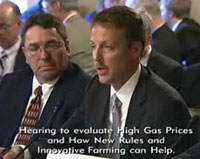 Back by popular demand, the fifth Process Optimization Seminar is heading to Houston on April 27-29, 2011. The event is designed for plant managers, operations managers, technical Managers, lab Managers and general managers who are ready to get more out of their ethanol plant. The three-day course is taught by leading industry technical leaders from Phibro Ethanol Performance Group, Fermentis, Novozymes, and Fremont Industries. This session, presenters will focus on topics ranging from overviews of new process technologies to help lower carbon output, to technical reviews of new products in development to strategies for better human resource management.
Back by popular demand, the fifth Process Optimization Seminar is heading to Houston on April 27-29, 2011. The event is designed for plant managers, operations managers, technical Managers, lab Managers and general managers who are ready to get more out of their ethanol plant. The three-day course is taught by leading industry technical leaders from Phibro Ethanol Performance Group, Fermentis, Novozymes, and Fremont Industries. This session, presenters will focus on topics ranging from overviews of new process technologies to help lower carbon output, to technical reviews of new products in development to strategies for better human resource management.
Tom Slunecka of Phibro says the seminars have been very popular with ethanol plant operators and managers. “There just can’t be enough education, there’s always things changing and new technologies available,” Slunecka said. “We keep the class sizes very small so about 60 people are invited each time.”
Slunecka says this seminar will be a little different than the previous four. “This seminar is going to give managers some really tactical advantages to advance small, incremental changes in their plant,” he said. “It’s going to give management at the plant some new ideas and new ways to help their team get the absolute maximum out of the plant’s fermentation.”
Listen to Tom talk about what this seminar has to offer here: Tom Slunecka Interview
Guest speakers at the Houston event include:
Randall Sigle – Renewable Fuels Ethanol Instructor, Northeast Community College, who will provide insight into people management.
Doug Durante – Executive Director, Clean Fuels Development Coalition, who will provide an overview of the issues the ethanol industry is facing in Washington, DC and discuss the opportunities that may be available through carbon credits.
Bill Roddy – Corporate Environmental Manager, ICM who will share insights on carbon modeling and life cycle assessments for shipments of ethanol to California.
Dave Vander Griend, CEO, ICM who will discuss insights on next generation plants and other insights on an ever evolving industry.
In addition to the eduational sessions, participants can also engage in a Valero refinery tour, a tour of the SGS labs that includes a reception and dinner, and a chance to see the Houston Astros play the St. Louis Cardinals on April 28th.
Space is extremely limited. Register by April 15 to receive the early registration rate of $200 and includes all sessions, tours, meals and entertainment. Click here to register.
 Community solar projects have always been good for the environment, but a company in New Jersey is making them pay for individual investments, especially senior citizens living on fixed incomes.
Community solar projects have always been good for the environment, but a company in New Jersey is making them pay for individual investments, especially senior citizens living on fixed incomes. In this edition of the Domestic Fuel Cast, I talk with Pete Ramsey, the Director of Business Development for GeoGenix. He explains that having an entire neighborhood put in a solar project helps realize some economies of scale … being able to have crews simultaneously work on several solar projects, materials, logistics, and things like that. He says doing community solar, as opposed to each individual putting up his or her own panels, also makes a lot of sense for senior citizens, who could realize a return on their investment in less than five years.
In this edition of the Domestic Fuel Cast, I talk with Pete Ramsey, the Director of Business Development for GeoGenix. He explains that having an entire neighborhood put in a solar project helps realize some economies of scale … being able to have crews simultaneously work on several solar projects, materials, logistics, and things like that. He says doing community solar, as opposed to each individual putting up his or her own panels, also makes a lot of sense for senior citizens, who could realize a return on their investment in less than five years.

 U. S. Secretary of Agriculture Tom Vilsack made a visit to St. Louis earlier this week where he was the keynote speaker at the St. Louis Agribusiness Club meeting. As part of his address, he noted the importance of biofuels production for rural economies.
U. S. Secretary of Agriculture Tom Vilsack made a visit to St. Louis earlier this week where he was the keynote speaker at the St. Louis Agribusiness Club meeting. As part of his address, he noted the importance of biofuels production for rural economies. The
The  USDA expects more five percent more corn to be planted this year according to the
USDA expects more five percent more corn to be planted this year according to the 



 “Fundamentals and Farming: Evaluating High Gas Prices and How New Rules and Innovative Farming Can Help” featured a panel that included POET CEO Jeff Broin who testified on how the industry needs market access to help alleviate high gas prices by increasing ethanol supplies through expansion in cellulosic ethanol.
“Fundamentals and Farming: Evaluating High Gas Prices and How New Rules and Innovative Farming Can Help” featured a panel that included POET CEO Jeff Broin who testified on how the industry needs market access to help alleviate high gas prices by increasing ethanol supplies through expansion in cellulosic ethanol. Back by popular demand, the fifth
Back by popular demand, the fifth